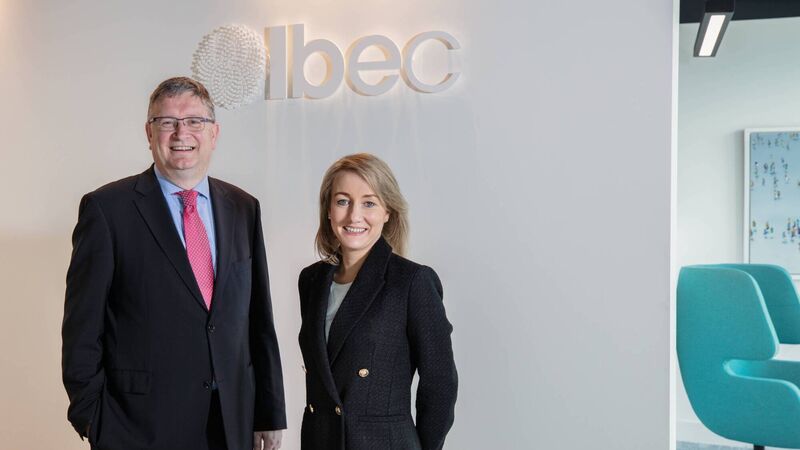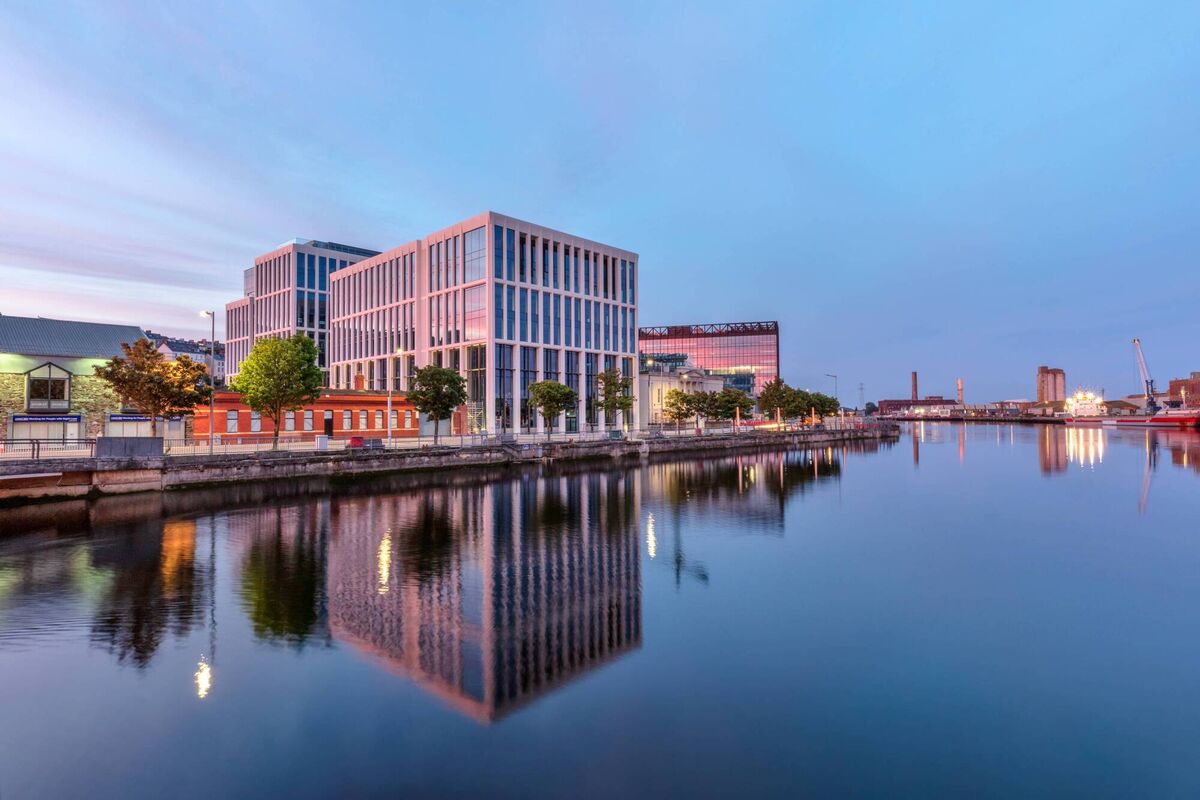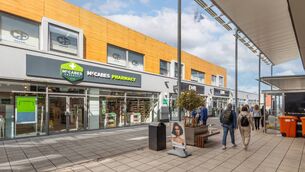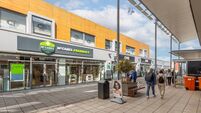Making Cork a better place to live, work and do business

Sean Gayer, Ibec Cork Regional President and Vice President of Operations at Boston Scientific Cork, with Ibec Head of Regional Policy, Helen Leahy.
Ibec’s vision for Cork is for the city centre, metropolitan area and wider region to realise its potential to become a globally competitive location which continues to attract investment from the world’s leading companies and becomes a magnet for top talent both from within Ireland and overseas.
Achieving that vision will be important not only for the Cork and wider Munster region but also for the continued growth and success of the national economy.
“Ireland needs a strong and successful Cork city-region,” says Ibec’s Head of Regional Policy Helen Leahy. “A vibrant Cork will act as a much-needed counterweight to the Dublin region and serve as a second pole for industrial and economic development and become a key enabler for more balanced regional development.”
Cork is poised to embark on a period of sustained and unprecedented growth which will see the city’s population grow by between 50% and 60% by 2040.
That growth will be based on Cork’s existing strengths which include a deep heritage in traditional industry sectors like food and drink along with the presence of internationally recognised life sciences and tech industry clusters as well as burgeoning energy and fintech sectors. Couple that industry base with a first-class education system which has consistently delivered a talent pipeline capable of meeting the needs of some of the most advanced companies in the world as well as a globally renowned research base and you have very solid foundations to build on.

“Cork is a thriving and ever-expanding hub of economic activity,” says Leahy. “The industry base in Cork is really strong and it continues to evolve and respond to changing market conditions. Along with sustained growth in established sectors like food, drink, life sciences and technology we’re also seeing significant growth in the international services sector in the city. Industry’s positive impact is evident in terms of both its employment and economic contribution.”
Those foundations will be enhanced by Cork's €3.5bn transport strategy which includes plans for a new light rail system, a major redesign of the city’s bus network, enhanced cycling infrastructure and a number of other measures to ease mobility for the people living and working in the metropolitan area.
The €350 million Docklands regeneration plan will add to Cork’s attractiveness while continuing investment in health, research, education and other critical infrastructure under the National Development Plan will boost it still further.
However, while Cork is well positioned when it comes to competing against other European cities for talent, trade and investment, there are still issues to address and barriers to overcome. A range of challenges in crucial quality of life areas like housing, healthcare, education, transport, and inter-regional connectivity need to be addressed if Cork is to realise its full potential.
Ibec is determined to play its role in dealing with those issues and helping Cork realise its growth ambitions by supporting local businesses, engaging with other stakeholders including policymakers, legislators and state agencies, and by championing the region’s investment priorities and interests at local, national, and international levels.
“Ibec members have made huge investments in Cork’s industrial and services base in recent years,” Leahy notes. “Ibec works to shape business conditions which in turn drives economic growth in the region. Businesses have made significant investments in Cork’s industrial and services base with new investments won and new jobs created. But delivery of public infrastructure will be key to activating the economic growth potential of the region.”

Planned investment in infrastructure with a focus on regeneration, consolidation and infrastructure-led development, will be key enablers of growth. A continued focus on building Cork, accelerating investment to support employment growth and long-term competitiveness, will ensure a more resilient regional economy that drives economic growth.
A compelling quality of life proposition is also critically important. “Better lives make for better business,” Leahy points out, referring to an Ibec campaign to make Ireland a better place to live and work.
“Investing in creating places where people want to come and live will be of paramount importance. An attractive environment, with appealing public space and access to amenities and services, including critical infrastructure in areas such as housing, transport, health, education and so on, will offer a quality of life which will attract talent, investment, and visitors to the city-region.”
The link between quality of life and economic development is stronger than ever. “Years ago, talent followed investment, but it’s very different now. People decide where to live on the basis of quality of life and access to services and industry tends to follow talent. The region needs to have all the building blocks in place to attract talent.”
Sean Gayer, President of Ibec's Cork Regional Executive Committee and Vice President of Operations at Boston Scientific, agrees: “We need the right skills, talent, connectivity, housing and quality of life for Cork to become an international city of choice. I believe the ambition is there, the economic strength is there — we just need to make sure that Cork is a location that is attractive for workers coming in.”
In that context, he welcomes Government plans for Cork in Project Ireland 2040 including new housing projects and supporting infrastructure, the Port of Cork upgrade, large-scale regeneration projects, a citywide public transport system, enhanced regional connectivity, improved healthcare facilities and services, and the expansion of educational institutes.

Those plans could be frustrated by delays in the planning system, however. “When we talk about infrastructure delivery one of the key obstacles is the planning system,” says Leahy.
“Ibec has been lobbying for reform of the system for many years and it appears that progress is now being made. This is critically important for all regions in Ireland. If we are to successfully deliver the infrastructure which the regions require to compete for investment and talent, the planning system needs to be simplified and streamlined while still protecting the public interest.”
That will be particularly important when it comes to the roll out of the Cork Metropolitan Area Transport Strategy and delivery of the long-awaited M20 motorway to connect Cork and Limerick. “Improved connections between Ireland’s second and third cities will strengthen and help create a new dynamic in the Munster region,” she adds. “We have waited far too long for this vitally important link and the region cannot afford any further delays. It is vital that the entire project is delivered in the shortest timeframe and moves forward to planning with urgency.
Investment in education will be pivotally important for Cork’s long-term competitiveness for FDI and its ability to nurture start-ups in key growth sectors like food, life sciences and ICT, Gayer adds.
“A high-quality education system is essential for meeting the needs of a quickly evolving economy, enhancing the talent pipeline, boosting the region’s innovation capacity and overall productivity. The recent announcement of a policy to further invest €307 million in core funding for higher education is critical for enhancing the quality and capacity of Ireland’s education institutions. Budget 2023 must make significant progress delivering this investment to protect the international reputation of Ireland’s education ecosystem and to continue to attract international investment and support indigenous enterprise.”
Cork also benefits from exceptionally strong collaboration between industry and the higher education and publicly funded research systems, Leahy notes. “For example, Cork is home to cutting edge research institutes like Tyndall, MaREI Centre and APC Microbiome which are supporting companies in Cork and throughout the country to innovate and develop ground-breaking new food and microelectronics products. We need to double down on that and ensure those centres receive the funding they need to maintain their position as world leaders.”
Exceptionally strong collaboration between industry and Munster Technological University and University College Cork also helps foster innovation, strengthen existing industry clusters, develop new ones, and attract top international talent to come to live and work in Cork. There is a strong entrepreneurial ecosystem centred around MTU’s Rubicon and Tom Crean Centres and associated research and development programmes which in turn drive future areas of economic growth.
Ibec’s decision to establish a significant office location in Penrose Dock in the heart of Cork’s future development is a signal of intent and firmly positions the organisation to support its forward-looking and ambitious vision for the future of Cork and secure a sustainable future for its members.

As Ireland's largest business lobby and representative group, Ibec brings its advocacy campaigns to bear to influence policies crucial for Cork’s future growth. With a workforce of close to 270 people across nine different office locations including a permanent team in Brussels leading its EU engagement, Ibec offers a far-reaching support network to its members.
The organisation’s 41 trade associations play a vital role in supporting the growth of Cork’s diverse industry base across multiple sectors. Those sectors are represented on Ibec's Cork Regional Executive Committee.
That cross-cutting organisational structure enables Ibec to play a unique role in supporting Cork’s future growth and success. “You will find a veritable who’s who of the Cork business community on our Regional Executive Committee,” says Leahy.
“This gives us strong local and regional leadership backed up by support at national level through the industry associations as well as by our other national and international resources. This allows businesses in Cork to have a voice in influencing regional, national and international policy.
“Ibec’s Cork Regional Executive Committee is a cross-sectoral group that brings deep industry expertise and a range of perspectives to the table,” adds Gayer. “We work in a collaborative way, to tackle the challenges facing business in Cork, to ensure Cork is an international city of choice to study or work in, visit, or invest in. Our goal is to ensure Cork continues to thrive and prosper, empowering business in the region to grow, build sustainable competitive advantage, and drive positive economic and societal impact.”
Ibec’s ambition is to make Cork a better place in which to live, work and do business and to push the regional economy onto a higher growth path, Leahy concludes. “Enhancing quality-of-life and addressing sustainability challenges will secure Cork’s place as a centre of national and international significance and stimulate long-term economic growth – growth that benefits everyone.”
Ibec is Ireland’s largest and most influential business lobby and representative group, with their members employing over 70% of private sector workers.
Ibec believes a strong economy and business climate can help make Ireland a better place to live and work in. Together with their trade associations, Ibec lobby government, policymakers and other key stakeholders with evidenced-based policies designed to positively shape business conditions and drive economic growth.
To find out more, visit www.ibec.ie/cork.





